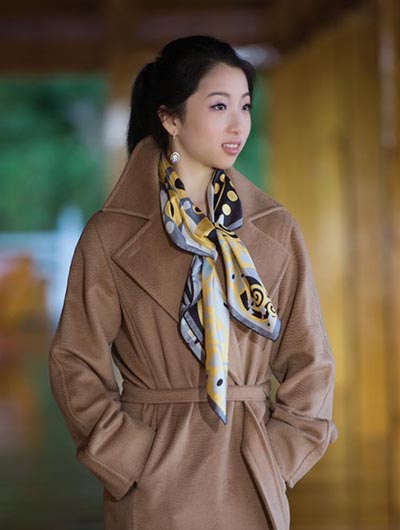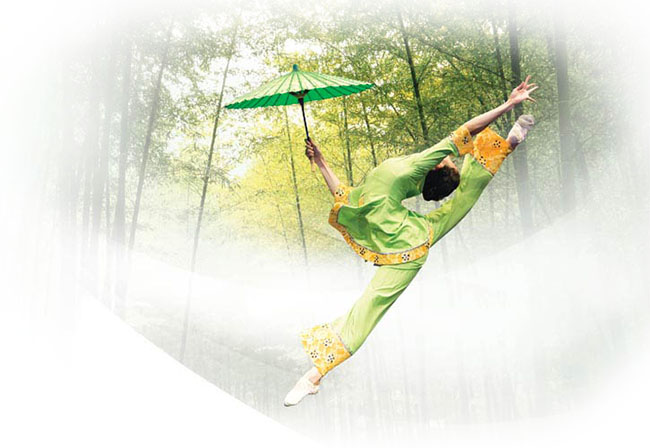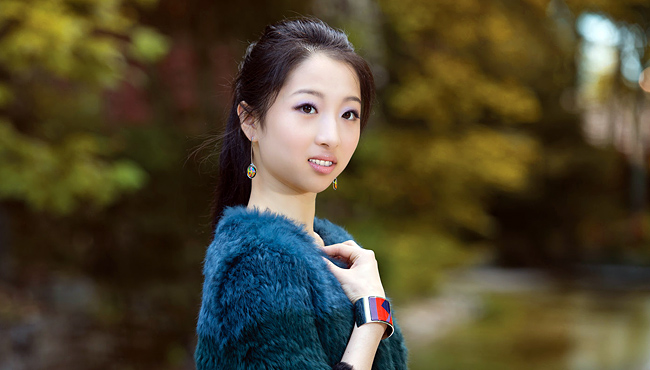Melody Qin’s mother loved dance and, when pregnant with Melody, she dreamt one night of a vast stage where she saw her lithe, grown-up daughter sashay, flip, and twirl. Naturally, she enrolled Melody at a young age in a local dance academy.
As a young teenager in northern China, Melody regularly rose to the top of her classes. She loved to be in school clubs and often led them. Her parents and grandparents nurtured her and looked forward to seeing her blossom into a young woman. But no one was prepared for the day her mother brought home news of the opportunity of a lifetime: Fei Tian Academy, the world’s premier training grounds for classical Chinese dance in upstate New York, was accepting enrollment applications.
Qin had never spent a night apart from her parents or grandparents. Attending Fei Tian Academy would mean moving to a new country to start professional training among strangers. However, once she was accepted, Qin made the tough decision to go, hoping to fulfill her mother’s dream.
Mrs. Qin carefully packed her daughter’s suitcases and the family watched her board the plane.
Something emerged when she landed in new territory: the characteristics that make Qin one of the finest classical Chinese dancers in the world. No sightseeing. No relaxation. Qin traveled straight to the dance studio and dove in.

When Qin arrived at Fei Tian Academy, however, her heart sank. She could see that her skills were far behind students her age who had attended world-class academies for years. Watching her teachers demonstrate, the gap between her and them seemed stratospheric. To compound things, she had to face every disappointment and discomfort without her family. She missed them so much, and the foreign culture and language disoriented her.
It was the perfect storm for someone accustomed to being the best and she seriously considered turning around. But there’s a very stubborn side to Qin’s personality and her tenacity goes beyond the average Chinese industriousness.
“I will not go back,” she promised herself. “I came here to dance. I have no choice but to dance well.”
From dream to reality
She practiced impressively hard even by ambitious standards and just one year later in 2009, when Qin had achieved a professional level of technique, form, and bearing, she was accepted into Shen Yun Performing Arts, the world’s top classical Chinese dance company, to tour the world’s most prestigious venues. Not only did she perform with Shen Yun, she was given lead roles.
Her mother’s dream had come true.
When Qin and her fellow Shen Yun dancers leapt and spun across stages such as New York’s Lincoln Centre, Washington D.C.’s Kennedy Centre, and Los Angeles’ Dorothy Chandler Pavilion, audiences described them as “beautiful,” “astounding,” and “mind-blowing.” They performed ethnic dances, folk dances and classical pieces as enchanting as life could be at the height of China’s dynasties.
“Audiences are always amazed by the way we portray legends and historical figures,” Qin says. “That’s the power of the outstanding expressiveness of this art form. During China’s 5,000-year history, classical Chinese dance has been continually added onto. It faced extinction at the hands of the Chinese communist regime but now belongs to the world again thanks to Shen Yun.”

Water sleeves
When Qin and Shen Yun are on tour, one of their best-received dances is “Water Sleeves.” The piece uses prop-like, long white sleeves that look like bright scarves when tossed. She laughs when she talks about her first days working with them.
“It was extremely difficult to control the water sleeves. If you wanted them to go to the left, they would go to the right; if you wanted them to go up, they would go down. They would swing around in a circle, only to end up wrapped around your head,” she said.
“Later I discovered that in order to control the water sleeves, I had to rely on the bearing aspect of our dance form— ‘encompass circles rather than straight lines,’ ‘to go left, go toward the right first;’ ‘to go up, go down first.’ When we did that, the sleeves became obedient, light and supple.” Learning to wield the sleeves, along with similar physical tests, gave the young dancers the inner strength needed to express the subtle and complex meanings in China’s ancient culture.
The name of the sleeves refers to more than the silky movement of the fabric. Onstage, the large group of dancers throw their white sleeves up in unison for an effect like a crashing wave. Later, they lay them gently over one arm like freshly washed swaddling clothes.
Water was revered by the Chinese ancients for its power, tolerance, inclusiveness and diversity. The ancients realized they could, like water, store up their inner strength and unlock it at will. Four-character idioms sprung up like “the characters of the most benevolent are like water” and “the ocean refuses no river.” Chinese ancients feared water, too, which led to the sayings “water can capsize a ship” and “the constant dropping of water hollows a stone.”

Dancing in the rain
One of the high points of Qin’s career was winning first place at the 2012 NTD Television International Classical Chinese Dance Competition with the solo “Beauty of Autumn Rain.” To capture just the right feeling for the piece, she actually danced outside in the rain. In between her forays, she imagined the ladies of Southern China with their bright floral parasols, nimble gestures, and tinkling laughter. Her performance at the competition sent murmurs through the audience.
Having been a tomboy, Qin says that one of the hardest things was for her to learn to be ladylike. “Strength is hidden inside,” she explains about traditional Chinese femininity. “A lot of this art form’s female dances demand core tautness while displaying a sense of softness on the outside.”
Today, Qin sees shades of herself in the new girls in Fei Tian Academy and at Shen Yun, and acts like a big sister to them. The standards for entry are even higher than when she arrived and she hopes to see these girls surpass her abilities and tour with the renowned company.
“My dance techniques might not change much from here on out,” Qin says. “But the improvement of my bearing, form and inner cultivation of a dance’s meaning are far from over. Those things are endless—lifetime pursuits for us here.”


